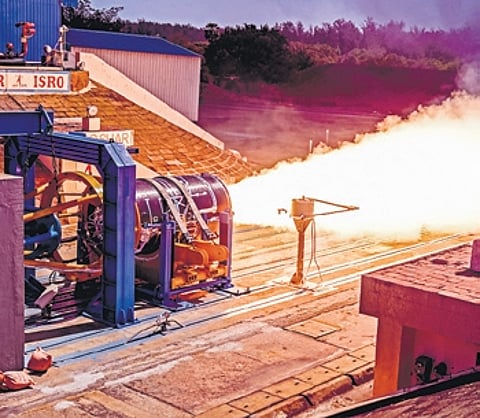

HYDERABAD : City-based startup Skyroot Aerospace successfully test-fired the second stage of the Vikram-1 space launch vehicle, named Kalam-250, at the propulsion testbed of the Indian Space Research Organisation (ISRO) at Satish Dhawan Space Centre (SDSC) in Sriharikota on Wednesday. Vikram-1 will be India’s first launch vehicle developed by the private sector. It has been designed and manufactured entirely in India.
The second stage of Vikram-1 will play a crucial role in the ascent of the launch vehicle, propelling it from the atmosphere to the deep vacuum of outer space. The test, lasting 85 seconds, recorded a peak sea-level thrust of 186 kilonewtons (kN), which will translate to a fully expanded vacuum thrust of 235 kN during flight.
The stage-2 test follows the startup’s suborbital space launch in November 2022. The third stage of Vikram-1, Kalam-100, was successfully test-fired in June 2021.
Speaking to TNIE, Pawan Chandana, co-founder and CEO of Skyroot Aerospace, said, “We have been working on this stage for the past three years. A team of 40 individuals, comprising both experienced professionals and freshers, has been involved in the project. We are progressing towards full flight this year, and this achievement marks a significant success, featuring three prime stages and one orbit adjustment module. Work on the first stage is currently underway. ISRO and IN-SPACe (Indian National Space Promotion and Authorisation Centre) have been incredibly supportive of our project.”
Test received support from Vikram Sarabhai Space Centre
The Kalam-250 features a high-strength carbon composite rocket motor using solid fuel and a high-performance ethylene-propylene-diene terpolymers (EPDM) thermal protection system (TPS). The stage includes a carbon ablative flex nozzle along with high-precision electro-mechanical actuators for thrust vector control of the vehicle, aiding in achieving the desired trajectory. This test also received significant support from another ISRO centre, the Vikram Sarabhai Space Centre (VSSC), which provided its proprietary head-mounted safe arm for the test, ensuring the safe operation of the rocket stage.